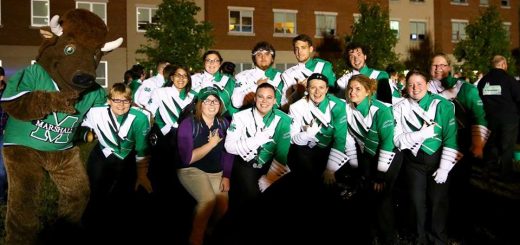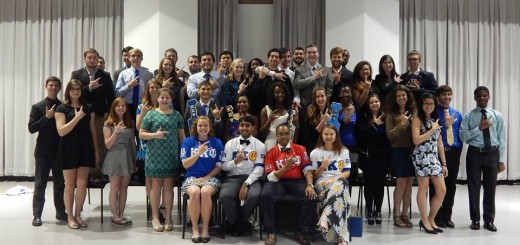Why Does HBCUlture Matter
by TarShae Odom, former Southeast District President
Zeta Eta – ΚΚΨ, South Carolina State University
The question typically doesn’t get asked often, partially because some people don’t ever get to see the totally different styles of the HBCU bands or maybe they just don’t care. However, the question remains: why do they play like that? I asked myself that same question the first time I ever heard the Blue & Gold Marching Machine of North Carolina A&T vs. The Marching 101 of South Carolina State University. That was the day my middle school band director Brother Adrian Wright introduced me to the culture of Historically Black Colleges and Universities, or HBCUs. It was at that moment when I started to do more research on different HBCU schools. Finally, I made the decision on where I wanted to attend school to further my education: Bethune Cookman University. However, the decision was changed when I met the late Dr. Robert Lawrence from South Carolina State University.
Growing up in a single parent household, I didn’t get to experience the HBCU lifestyle at an early stage in my life. My mother is a graduate of Benedict College and South Carolina State University; she would tell us bits and pieces of things she experienced during her time at those institutions. Personally, the most influential story she told was about becoming a sister of Alpha Kappa Alpha Sorority Inc. The cultural impact was there, but could I really call it an impact without even really seeing it for myself? It was then, my 9th grade year, that my high school band director took us to an HBCU homecoming at South Carolina State University. From that moment on I decided there was nothing stopping me from attending an HBCU school to continue my education.
Once I arrived as a freshman at SC State, I was welcomed with open arms first by two organizations, Tau Beta Sigma (TBS) and Kappa Kappa Psi (KKPsi). The sisters welcomed all the freshmen by showing band members around campus and where to register for band camp. Then the brothers would help all band members move into their dorm rooms. At first, I was confused; I wasn’t expecting upperclassmen, let alone men and women of both organizations to help someone like me. Their work didn’t just stop there with assisting us to move in, but it continued throughout the entire school year. Once football season began, a lot of people not associated with the band assumed that we would stop working. That wasn’t the case at all: the brothers of Zeta Eta Chapter worked from the month of July all the way up till the month of June during our annual High/Middle School Band Camp.

In the fall of 2019, I decided to step out of my comfort zone and do something my freshman self would have never imagined: I decided to run for the Southeast District President position. I ran for that position not for myself, but because I saw there was more work to be done for our HBCU chapters. The traditions and the culture experience at our HBCU schools are like no other. The rich culture of campus life is also seen in our band programs; when that happens you see a team working together not just to make music, but to perpetuate the culture of our institution. Since our bands have such an important role in preserving the spirit of our HBCUs, KKPsi and TBS are important parts of our band programs. Ultimately, what many brothers not attending an HBCU don’t understand is that the HBCU culture is more than just how we play, it affects how we gather. How has the HBCU culture impacted our brothers and our chapters of KKPsi? One brother from the Zeta Psi chapter says “the HBCU culture has shown me what a real brotherhood is.” Many people might say that a person can learn real brotherhood anywhere. That is not true at all; some people came into school as an only child depending on cousins or other friends out their family to step in as brothers for some of us. When brothers travel and visit other schools they want to feel welcomed and know that someone will be there. Another brother from the Iota Zeta chapter says “the HBCU culture provided role models that looked like me, and that’s what I wanted to be like.”
I believe that the sense of brotherhood does not first start when you become a brother of Kappa Kappa Psi; the first real brotherhood starts when you enter the band as a freshman. For the next four or five years, these same individuals that came in with you will either be with you till the end, or some of them may fall off on the wayside. The “HBCUlture” provides this sense of family when you first move into your dorm room. Often, we hear schools praise their football teams, basketball, or other programs on their campus; however, at an HBCU it’s all about the band! Regardless of the size of the band, HBCUs take pride in traditions like zero quarter before the game, halftime, and that 5th quarter at the end of the game. During my time at an HBCU, I’ve learned to put these three phases of our band’s day into a little analogy: zero quarter is your appetizer, halftime is your entree, and then your 5th quarter is your dessert.

Attending an HBCU school allowed me to gain more understanding of my heritage and the meaning of home away from home. Many people that don’t understand or try to understand HBCUlture have a negative image of these schools simply because they are different. During our National Leadership Conference this summer I had the privilege to sit on a panel discussion with three phenomenal HBCU alumni brothers, Robert Bratcher, Rassi Elliot and Kalem Graham. On this panel I made a statement that I try to make sure I follow faithfully now, which is “Just Talk.” To understand the HBCUlture, one has to be willing to step outside of their comfort zone, be open to learning about new traditions, and most importantly, be willing to talk with students from HBCUs to learn about their experiences. In music, we learn to be open to new ideas, and in order to bond with HBCU brothers, one must be willing to be open minded and experience something different.

What type of impact does KKPsi have on an HBCU Campus? We bring recognition to the fraternity because Kappa Kappa Psi is well represented on our campuses. Just like we bring enthusiasm to our bands, we work just as hard for Kappa Kappa Psi to be positively represented across campus. Attending an HBCU is already competitive because of the environment of the band scene; however, our campus organizations are more competitive because we are all driven to be better than we were yesterday. Being a brother of Kappa Kappa Psi on an HBCU campus is not as easy as it may seem; we go through many obstacles and hurdles just to be allowed to do things on campus in comparison to other Greek organizations. As brothers of Kappa Kappa Psi we don’t just exemplify precision marching and diligence on the practice field, but also in the classroom, other organizations on campus, and the community. From the start of freshman year we are taught the value of serving others prior to becoming brothers of Kappa Kappa Psi.

The passion and drive found in our chapters doesn’t start when we become brothers, it starts our freshman year as rookies, freshman, or c.r.a.b.s (current rookie attaining bandsmen status). Nothing is given in life to you; we must earn the things we work for. Without having Kappa Kappa Psi at HBCUs, the student body will only know the “Divine 9, which will take away the connection from campus to the band. Without the HBCU influence on Kappa Kappa Psi, a powerful piece of tradition and culture would be missing from this fraternity. The traditions and spirit that exist within HBCU chapters can never be recreated. Without Kappa Kappa Psi on an HBCU campus a certain spark is missing from that band program. The band can be great beyond all means, but that true funk, swag, and enthusiasm is really missing. The HBCUlture matters to this Fraternity because we bring a different zeal and drive to improve our brotherhood, and our fraternity is truly made great when we value the diverse ways chapters serve their diverse communities and bands.
Brothers of Kappa Kappa Psi, when you look into the history of the fraternity HBCU chapters have made big strides within our organization. However, the HBCUlture somehow has been overlooked and in many ways seems like it is trying to wash away. The National Council is working towards bringing more awareness and better understanding to our chapters. At the same time brothers you must show the action instead of talking about it. We have seen what has taken place within our country this year, and the power it has had on our fraternity. It is time for us to work together more now than ever to make sure that all our chapters are on an even playing field, and treated with the same respect. I leave you with this: hard conversations turn out to be the best conversations, so be willing to listen to one another, and most importantly, just talk!




